While the constantly evolving COVID-19 situation makes it difficult to predict, a number of studies have shown that students are more likely to delay rather than cancel study abroad plans and it is predicted that demand for study abroad will surge as the pandemic subsides. It has also been suggested that there will be a shift in market share post-COVID as a result of countries’ handling of the crisis.
A recent article published by i-graduate drawing on data from a global survey of over 24,000 students in eleven countries looked at governmental responses to COVID-19 along with students’ satisfaction with their institution’s response by country. This piece focuses on the views of international students, a group of students of particular value to institutions – socially, culturally and financially – who, with travel restrictions, have been especially impacted by COVID-19. Some international students are ‘stuck’ in their host country, unable to leave due to uncertainty about when they would be able to return. Others have returned home and continued to study online. Some new students have been unable to travel to begin their international education experience.
For international students, both current and prospective, it is likely to be not just the host country’s handling of the pandemic, but also their institution’s response that colours their experience and informs future thinking. So how does the institutional response to COVID-19 compare across countries in the eyes of international students? And how might this contribute to the retention of existing students and recruitment of new ones?
Institutional response to COVID-19: how satisfied are students?
While satisfaction is by no means universal, the majority of the 9,000+ international students globally who participated in the survey were satisfied overall with their institution’s response to COVID-19: 71% were satisfied or very satisfied. This was similar to 69% satisfaction amongst domestic students. In line with the previous article from i-graduate that included analysis of data for all students, both domestic and international, of the key countries included in the survey, German institutions appear to have been the most successful in their response to COVID-19: 84% of their international students were satisfied or very satisfied.
Fig 1: Satisfaction overall with their institution’s response to COVID-19 – International students
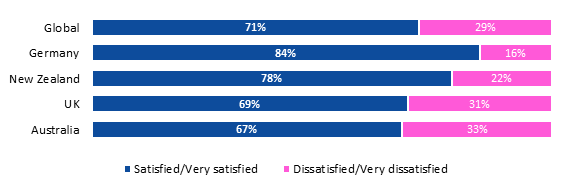
International students at German institutions were also most likely to be satisfied with communication from their institution in response to COVID-19 (87% satisfied or very satisfied), followed closely by international students at New Zealand institutions (84%).
Fig 2: Satisfaction with communication from their institution in response to COVID-19 - International students
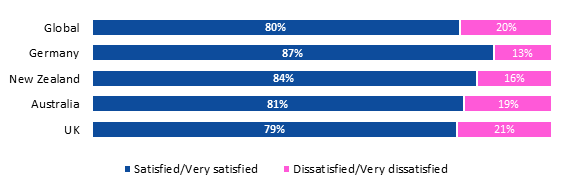
As shown in Figure 3 below, international and domestic students globally were similarly satisfied with information from their institution on physical health advice, and wellbeing support. International students were notably more likely than domestic students, though, to be satisfied with information on teaching/learning elements: organisation of tests/exams, organisation of online lectures/tutorials, and online learning resources. They were also more likely to be satisfied with communication overall. Unless provided with different information, this result is likely to be due to cultural reasons or differences in expectations. International students were less likely to be satisfied with information on financial support and travel restrictions.
Fig 3: Satisfaction with different information from institution in response to COVID-19 - Global - % satisfied or very satisfied
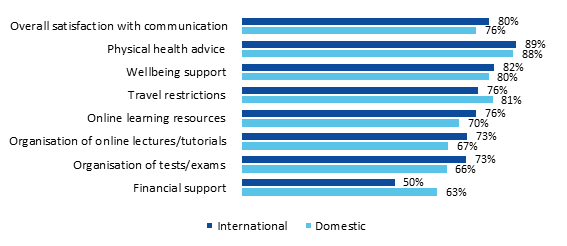
Looking at satisfaction by country as shown in Table 1 below, German institutions stand out again in relation to satisfaction with information on teaching/learning elements. International students in New Zealand reported notably higher levels of satisfaction than those in other countries with wellbeing support and financial support.
Table 1: Satisfaction with different information from their institution in response to COVID-19 - International students - % satisfied or very satisfied

The online learning experience
In line with earlier results, international students in Germany were also those most likely to be satisfied with the online learning experience overall at their institution: 80% of students satisfied or very satisfied. The satisfaction level amongst international students in New Zealand (75%) was also above the global average.
Fig 4: Satisfaction overall with the online learning experience at their institution - International students
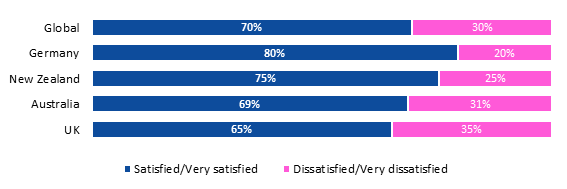
At a global level, international students were at least slightly more likely than domestic students to be satisfied with all aspects of their online learning experience.
Fig 5: Satisfaction with aspects of their online learning experience - Global - % satisfied or very satisfied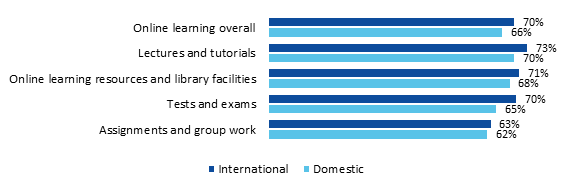
Satisfaction varied considerably by country, though, as shown in Table 2 below. While international students in Germany stood out in terms of satisfaction with lectures and tutorials, international students at institutions in New Zealand were notably more likely than others to be satisfied with online learning resources and library facilities and assignments and group work.
Table 2: Satisfaction with aspects of online learning experience - International students - % satisfied or very satisfied

Given the potentially greater disruption from COVID-19 for international than domestic students due to factors such as border closures and travel restrictions, it is perhaps not surprising that international students globally were more likely to be concerned about continuing further studies, completing their course or graduating; 68% of international students were concerned about this compared to 61% of domestic students.
Fig 6: Level of concern about continuing further studies, completing their course or graduating - Global

Levels of concern varied considerably by country, lowest amongst international students in Germany and New Zealand (55%) and highest amongst international students in the UK (75%).
Fig 7: Level of concern about continuing further studies, completing their course or graduating - International students
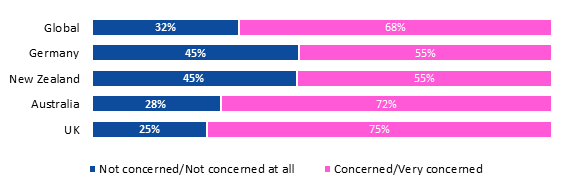
What concerns students most about COVID-19
The need for institutions to understand the concerns of different groups of students so they can best provide appropriate support is illustrated in Figure 8 below, which shows differences in key concerns between international and domestic students. International students were notably more likely than domestic students to cite funding their studies as their top concern, while, as may be expected, travel restrictions were also more of an issue.
Figure 8: Students’ top concern about COVID-19 - Global
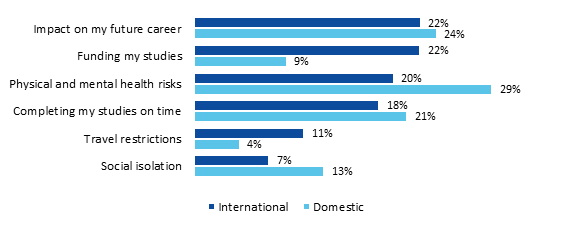
Again, and no doubt due at least in part to sample composition, key concerns of international students varied by country, as shown in Table 3. For international students in Australia, funding was the most commonly cited concern. In the UK it was the impact on students’ future career. In New Zealand the most common key concerns were impact on future career and physical and mental health risks, while in Germany key concerns were relatively evenly split between funding of studies, physical and mental health risks, completing studies on time and the impact on students’ future career. What is clear is that even within a country, key concerns vary by individual based on personal circumstances.
Table 3: Students’ top concern about COVID-19 - International students

Concluding remarks
The COVID-19 environment is uncertain and constantly evolving. While this analysis provides useful insight into how satisfied international students were with their institution’s response to the pandemic, data reflects students’ reactions at a certain point in time. With continuing developments surrounding COVID-19 and an accepted realisation that the virus will affect the way universities operate in the longer term, it will be interesting to see how students’ views evolve as institutions’ responses develop; from recent media coverage in some countries, it seems that in some cases the results will not be positive. The inclusion of relevant questions into the next wave of i-graduate’s International Student Barometer will allow us to see how views have changed since this initial survey was conducted.
With a second wave of COVID-19 currently sweeping through many countries, it is unclear when the numerous travel restrictions that are in place will end. Some countries, however, are gradually and cautiously beginning to let international students return, and as this progresses it is likely that countries that have been successful in dealing with COVID-19 will benefit in terms of international student recruitment. This will hold true for individual institutions too, with those who have best understood and responded to the views and needs of their students most likely to see returns.
Information on COVID-19 Response Barometer
The COVID-19 Response Barometer was developed and administered by global research and benchmarking organisation i-graduate. Participation in the survey was offered free of charge. Survey fieldwork began on 7 May 2020 and is still ongoing at a small number of institutions globally. Analysis in this article is based on data as of 28 August 2020, comprising 24,009 responses from students at 41 institutions around the world, 9,051 of those responses from international students. Numbers of institutions and international student responses from the four countries featured in this article are as follows: UK – 7 institutions, 1,780 responses; New Zealand – 7 institutions, 1,724 responses; Australia – 6 institutions, 1,203 responses; Germany – 4 institutions, 994 responses. To allow institutions to continue to measure and track student satisfaction with their response to COVID-19, a number of questions from the COVID-19 Response Barometer will be included in i-graduate’s 2020 Student Barometer and International Student Barometer surveys. For more information on any of these surveys, please contact info@i-graduate.org.




